Why Understanding How to Become a CIA Analyst Matters for National Security
How to become a CIA analyst is a question that starts with understanding the commitment required to serve at the heart of America's intelligence apparatus. The path involves five critical steps:
- Education: Earn a bachelor's degree (minimum 3.0 GPA), preferably in a relevant field like International Affairs, Political Science, Economics, or STEM.
- Experience: Gain relevant experience through internships, military service, law enforcement, or foreign language study.
- Eligibility: Meet all CIA requirements, including U.S. citizenship, age, and willingness to relocate to Washington D.C.
- Application: Submit your application via MyLINK and pass screening, testing, and interviews to receive a Conditional Offer of Employment.
- Clearance: Complete the comprehensive security clearance process, including a background investigation, polygraph, and psychological evaluation (6-18 months).
The Central Intelligence Agency is the nation's first line of defense, demanding individuals who can turn raw information into actionable intelligence. CIA analysts examine everything from satellite imagery to confidential sources to advise the President and senior policymakers on matters that prevent conflicts, disrupt terrorism, and protect American lives.
This career is not for everyone. The process is rigorous, with a background investigation that can take over a year and a mandatory polygraph exam. The work demands unwavering integrity, discretion, and objectivity. For those who answer the call, it is one of the most meaningful ways to serve the nation.
The CIA has five directorates. The Directorate of Analysis is home to most intelligence analysts. The other directorates focus on clandestine collection (Operations), technology (Science & Technology), cyber threats (Digital Innovation), and mission support (Support).
At McAfee Institute, we train professionals to develop the analytical and investigative skills that agencies like the CIA value. While we can't guarantee a position, we can help you build the foundational expertise that makes you a stronger candidate for intelligence-driven roles in federal agencies, law enforcement, and the private sector.
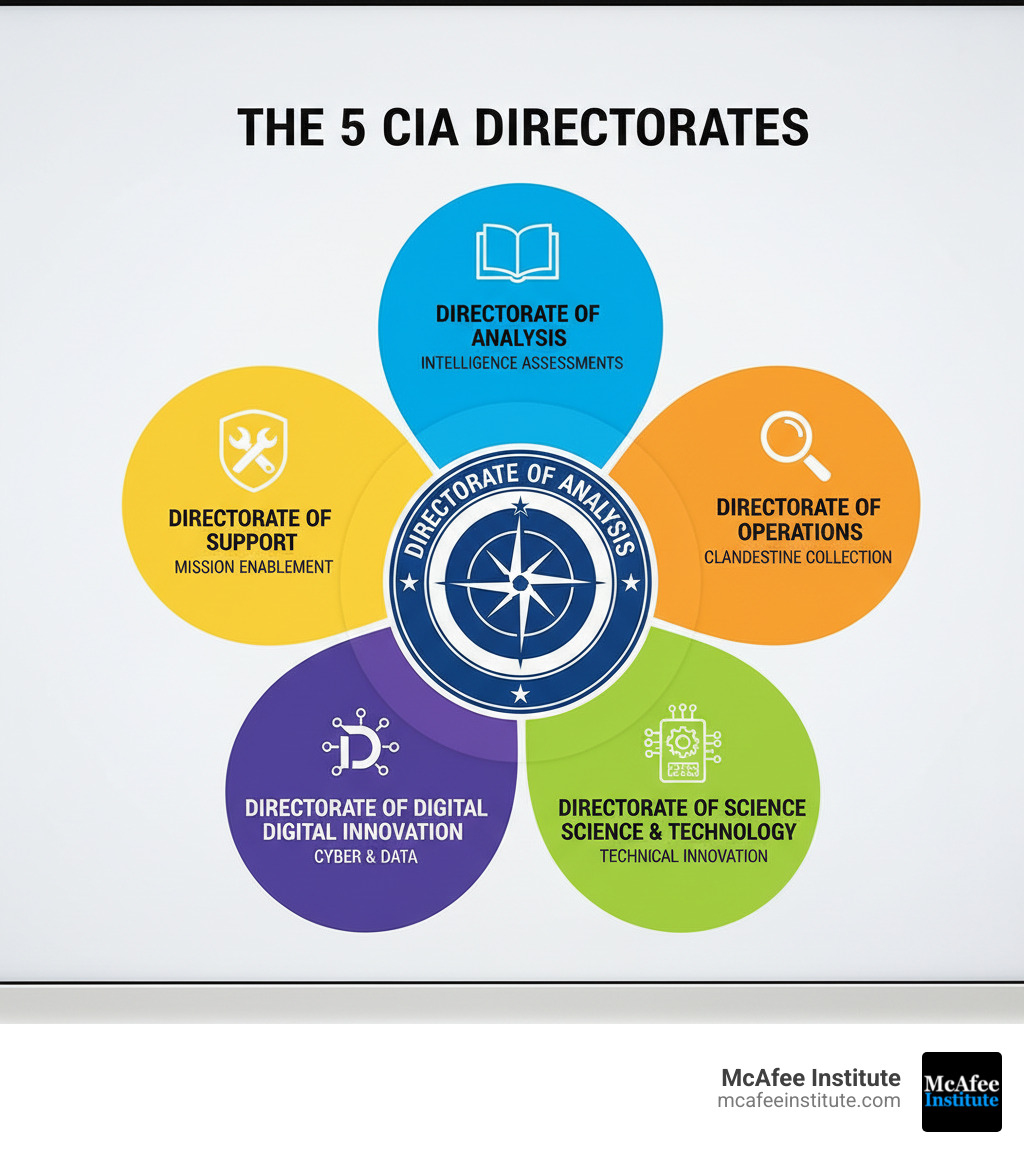
What is a CIA Analyst? The Mind Behind the Mission
If you're researching how to become a CIA analyst, you need to understand what these professionals actually do. A CIA analyst is a professional puzzle-solver who works with incomplete information under high-stakes conditions. You're not just collecting data; you're making sense of it, finding the story hidden in the noise, and presenting it to decision-makers.
Most analysts work in the Directorate of Intelligence. Your job is to take information from every available source—foreign newspapers, satellite imagery, confidential informants, economic data—and transform it into meaningful intelligence. You might analyze economic trends, assess a foreign government's stability, or help counterterrorism specialists understand an emerging threat.
The work requires both breadth and depth in areas like geopolitical analysis, economic trends, and counterterrorism. Critically, you must communicate your findings clearly to policymakers who depend on your expertise to make informed decisions.

The Analyst's Core Responsibilities
While there's no "typical" day, certain responsibilities define the role:
- Examining Information: You'll spend significant time absorbing information from open-source intelligence, classified reports, and technical collection systems.
- Identifying Patterns: The real skill is seeing connections that others miss, spotting anomalies in data that suggest something bigger is happening.
- Advising Senior Officials: You distill everything you've learned into intelligence that decision-makers can use, whether in a written assessment or a direct briefing.
- Monitoring Global Threats: You're constantly tracking threats like terrorism, organized crime, weapons proliferation, and political instability.
- Producing Written Intelligence: Much of your work takes the form of rigorously sourced, carefully reasoned documents that must withstand intense scrutiny.
- Presenting Findings: Strong verbal communication skills are essential for briefing stakeholders and defending your analysis.
The Mission and Values Driving Analysis
Understanding how to become a CIA analyst means embracing the mission: protecting the Nation by providing objective intelligence to help policymakers make informed decisions.
Objectivity is the most challenging part of the job. You cannot let personal beliefs or political preferences color your analysis. Your job is to tell the truth as you see it in the evidence, even when it's uncomfortable.
Everything you do serves U.S. national security objectives, from preventing a terrorist attack to assessing the intentions of a foreign leader. The goal is to preempt threats before they fully materialize, giving policymakers time to act. Through it all, upholding integrity is non-negotiable. The CIA needs trustworthy, discreet people committed to the mission above all else. This isn't just a job—it's a calling.
Foundational Pillars: Education and Experience
How to become a CIA analyst starts with a rock-solid foundation of education and experience. A bachelor's degree is your entry ticket, and the CIA requires a GPA of 3.0 or higher. While a bachelor's degree opens the door, an advanced degree—like a master's—can significantly strengthen your application.
The CIA values real-world experience just as much as academic credentials. Internships and co-ops provide invaluable hands-on training, and the agency offers its own undergraduate programs. Military service or a background in law enforcement demonstrates the discipline and integrity the agency prizes. A key differentiator is foreign language proficiency, which makes you exponentially more valuable in a global intelligence environment.
At McAfee Institute, our Board Certifications in Intelligence & Investigations provide specialized knowledge that translates directly into the kind of expertise the CIA looks for in its analysts.

Advantageous Academic Paths
While there's no single "CIA analyst degree," certain fields consistently produce strong candidates. These include:
- International Affairs/Relations
- Political Science
- Economics
- National Security Studies
- STEM fields (Computer Science, Data Analytics, Statistics)
- Journalism or Library Science
- Terrorism Studies
For those interested in becoming analytic methodologists, degrees in Mathematics, Computer Programming, Modeling, or GIS are highly sought after. Regardless of your major, focus on coursework that develops your research methods, statistics, and critical thinking abilities.
Building Relevant Practical Experience
Practical experience often determines whether you get the job. The CIA wants to see that you've applied your knowledge in real-world settings.
The CIA's own paid undergraduate internships and co-ops are golden opportunities. Fellowships in government or intelligence also offer valuable exposure. However, some of the most impressive experience comes from working or studying abroad. This demonstrates adaptability, cultural sensitivity, and a global perspective. This kind of cultural immersion is invaluable when analyzing intelligence about a foreign region.
Developing deep expertise in a specific area—whether a region, a threat like narcotics trafficking, or a technical domain—can make you an exceptionally attractive candidate. If you've served in the military or law enforcement, you bring directly transferable experience in intelligence gathering and operations.
Today, Open Source Intelligence (OSINT) is a core competency. Our guide on Understanding OSINT: A Comprehensive Guide offers insights into methodologies modern analysts use to piece together intelligence from publicly available information.
How to Become a CIA Analyst: The Application and Vetting Gauntlet
The path to becoming a CIA analyst is deliberately exhaustive, designed to ensure that only the most qualified and trustworthy individuals earn the privilege of serving. The application and vetting process tests your skills, knowledge, integrity, and patience, often stretching from several months to over a year. Understanding what lies ahead will help you prepare for the journey.
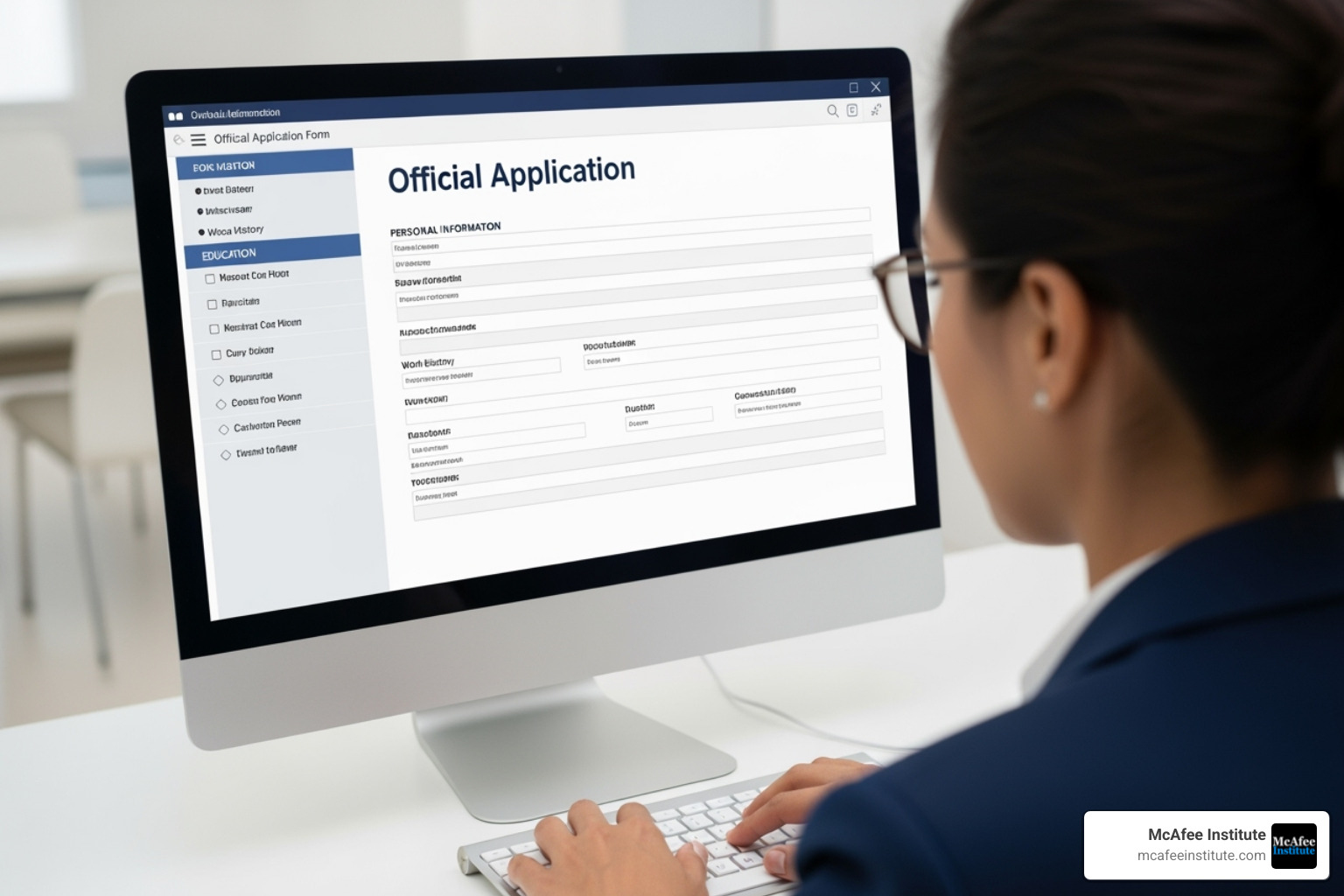
Meeting the Minimum Requirements to Apply
Before you apply, you must clear several non-negotiable requirements:
- You must be a U.S. citizen and physically present in the U.S. when you apply.
- You must be at least 18 years old.
- You must be willing to relocate to the Washington, D.C. metropolitan area.
- Male applicants must be registered for the Selective Service. You can verify your status at the Selective Service Registered for the Selective Service website.
- You must comply with the drug use policy: no marijuana or THC use within 90 days prior to applying, and no other illegal drug use within one year. Honesty about past use beyond these windows is critical; lying is an automatic disqualifier.
For a complete list, review the official CIA Requirements page.
Navigating the CIA Hiring Process Step-by-Step
Understanding how to become a CIA analyst means preparing for a multi-stage process:
- Online Application: Your journey begins via MyLINK, the CIA's recruitment portal. Tailor your resume to the specific analyst position.
- Screening and Testing: If your application is selected, you'll undergo written assessments and cognitive ability tests to measure your analytical horsepower.
- Interviews: Successful candidates advance to multiple interview rounds, including behavioral and technical interviews with CIA professionals.
- Conditional Offer of Employment (COE): If you pass the interviews, you may receive a COE. This offer is entirely dependent on completing the security clearance process.
The entire hiring timeline from application to final offer typically spans many months to over a year. Patience is required.
The Security Clearance Deep Dive: How to become a CIA analyst and pass the background check
To work as a CIA analyst, you must obtain a Top-Secret SCI (Sensitive Compartmented Information) Clearance. This is an exhaustive investigation into your life that can take over a year.
The comprehensive background investigation examines your financial history, employment, education, personal relationships, and foreign travel. Investigators will interview friends, family, colleagues, and neighbors.
Every applicant must pass a polygraph examination to assess honesty and a psychological and medical evaluation to ensure you are mentally and physically fit for the demands of intelligence work.
What can derail your clearance? The most common disqualifiers are issues of trust and judgment. Lack of candor—any dishonesty or omission—is the fastest way to be disqualified. Other red flags include serious criminal conduct, financial issues like significant debt or bankruptcy, a history of substance abuse, and poor judgment demonstrated on social media.
Thriving as an Analyst: Essential Skills and Career Trajectory
Successfully joining the CIA as an analyst is just the beginning. Thriving in this demanding environment requires a blend of innate abilities and continuously honed skills. The career path is dynamic, offering significant growth from an entry-level analyst to senior leadership roles. The CIA invests heavily in professional development, recognizing that the skills of its workforce must evolve with the threats facing our nation.

The Analyst's Toolkit: Core Competencies for Success
An analyst's mind is their most powerful weapon. The agency seeks individuals with a robust set of intellectual and interpersonal skills:
- Critical Thinking: The ability to evaluate information objectively, identify biases, and draw logical conclusions from incomplete data.
- Strong Writing Skills: Your analysis is only as good as your ability to convey it clearly, concisely, and persuasively in written reports for senior policymakers.
- Oral Communication: You must be able to brief senior officials, present findings, and explain complex situations to diverse audiences.
- Problem-Solving: This requires breaking down complex challenges, developing innovative solutions, and anticipating future scenarios.
- Objectivity and Intellectual Honesty: You must maintain an unbiased perspective, even when confronted with inconvenient truths. Your loyalty is to the truth and the mission.
- Discretion: Maintaining confidentiality is a way of life. You will carry the weight of secrets that could cause tremendous harm if disclosed.
- Teamwork: Intelligence work is a collaborative effort. The best products emerge from teams that challenge and build on each other's strengths.
Exploring advanced methodologies, like those in 5 Incredible OSINT Techniques to Supercharge Your Investigations in 2025, can provide a competitive edge.
The Future of Intelligence: How to become a CIA analyst in the age of AI
The intelligence landscape is evolving rapidly, with AI and data science reshaping analysis. The CIA actively recruits Artificial Intelligence Specialists to apply machine learning to vast amounts of data, augmenting analyst capabilities. These roles, with starting salaries from $68,405 to $181,216, are critical to the mission.
Open Source Intelligence (OSINT) has also become a vital discipline. Open Source Targeters specialize in finding and exploiting publicly available data to generate foreign intelligence. This role requires an investigative mindset and strong technical communication skills. Today's analysts are as likely to be writing algorithms as they are to be poring over classified documents. For more on this, see How AI is Transforming the Future of Investigations.
Beyond Analysis: Career Paths and Benefits
A career as a CIA analyst offers significant opportunities for professional growth.
Career progression can lead to senior analyst roles, where you become a go-to expert, or into management tracks. Inter-agency assignments with other parts of the national security apparatus broaden your experience. While based in Washington, D.C., overseas travel opportunities exist for temporary duty or longer-term postings.
The CIA offers competitive federal salaries (e.g., an Open Source Targeter can earn between $72,965 and $128,956) and may offer foreign language bonuses. The comprehensive benefits package includes health programs, generous time off, and support for continuing education.
Beyond the benefits, working as a CIA analyst is about serving a mission greater than yourself. At McAfee Institute, our Board Certifications in Intelligence & Investigations provide government-recognized credentials that demonstrate your commitment to professional excellence.
Frequently Asked Questions about Becoming a CIA Analyst
You're serious about understanding how to become a CIA analyst, but you likely still have practical questions. Here are answers to the ones we hear most often.
How long does the entire CIA hiring process take?
Patience is a requirement. The CIA hiring process is extensive and thorough. From submitting your application to receiving a final offer, you should expect the process to take many months to over a year. The timeline varies depending on the complexity of your background, but the security clearance phase alone can be lengthy. Our advice is to apply and continue building your skills and experience. Don't put your life on hold.
Can I apply to the CIA if I have used drugs in the past?
This is a common concern. The CIA has a strict drug policy, but past use is not an automatic disqualifier. The key is honesty.
- For marijuana or THC products, you must not have used them within 90 days prior to applying.
- For all other illegal drugs or misused prescription medications, you must not have used them within one year prior to applying.
Candor about past use is absolutely critical. The agency expects complete honesty. An attempt to hide or lie about past drug use, which will be uncovered during the polygraph, is a near-certain disqualifier. A complicated past can be worked with; dishonesty cannot.
What is the most important quality for a CIA analyst?
While intelligence and education are vital, the most important quality is a combination of objective critical thinking, unwavering personal integrity, and a profound commitment to the mission.
- Objective critical thinking means you follow the evidence wherever it leads, free from personal bias or political preference.
- Unwavering personal integrity means you are trustworthy and discreet, capable of protecting the nation's most sensitive secrets.
- Commitment to the mission means you are driven by a genuine desire to serve and protect the United States.
Other essential skills, which can be developed over time, include strong writing and oral communication, problem-solving abilities, and teamwork. Integrity and commitment, however, must come from within. Specialized training, like the programs at McAfee Institute, can help you build the analytical foundations that make you a stronger candidate for intelligence-driven careers.
Conclusion: Your Mission Starts Now
The path to how to become a CIA analyst is long and demanding, testing your intellect, character, and dedication. It is a commitment to working in the shadows so others can live safely in the light, turning complex information into insights that can save lives. If you feel a pull toward this kind of national service, you understand what drives the best analysts.
Building the skills to be a competitive candidate requires deliberate professional development. That's where McAfee Institute comes in.
We can't guarantee you a position at the CIA, but we can help you build the foundational expertise that makes you a stronger candidate for intelligence roles across the government and private sector. Our government-recognized certifications are designed by professionals who have lived this work.
What sets us apart? Lifetime access to every program, live instructor support, and free updates for life. There are no annual renewals or hidden fees—just comprehensive training that stays with you throughout your career.
Your mission doesn't have to wait for an acceptance letter. It starts the moment you decide to invest in yourself and commit to a career of service and integrity. Start by learning more about how our programs can support your goals.


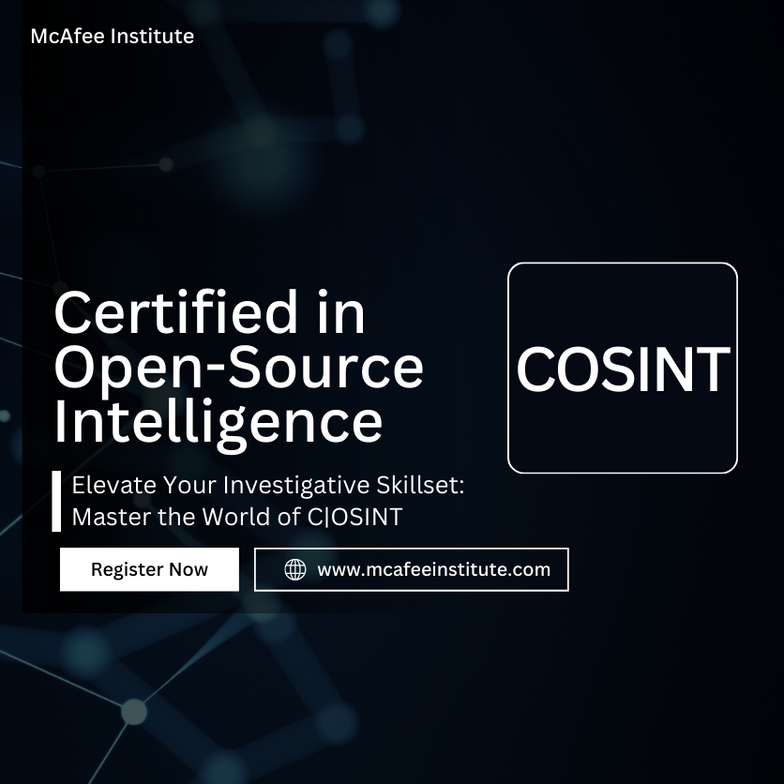

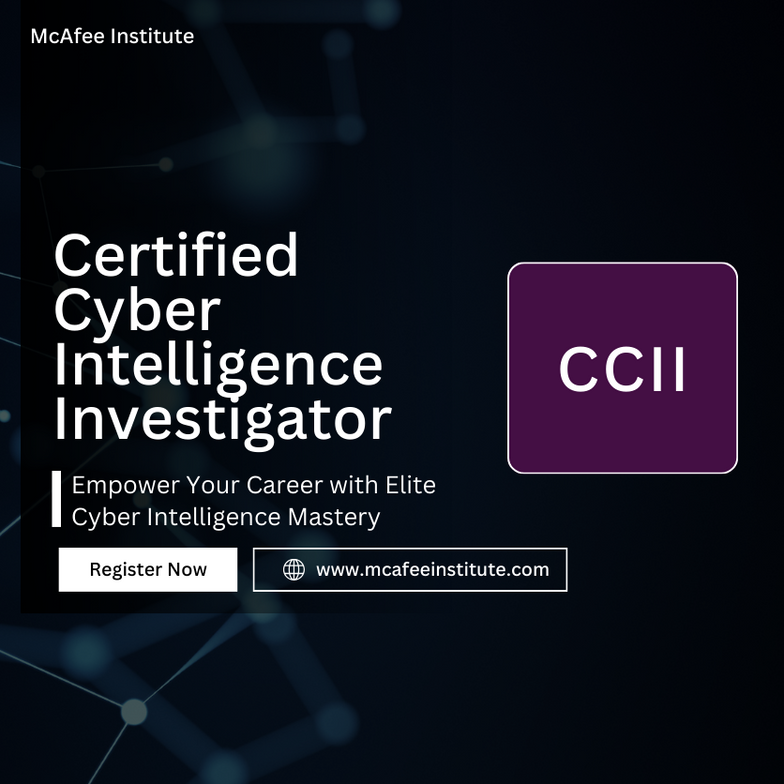
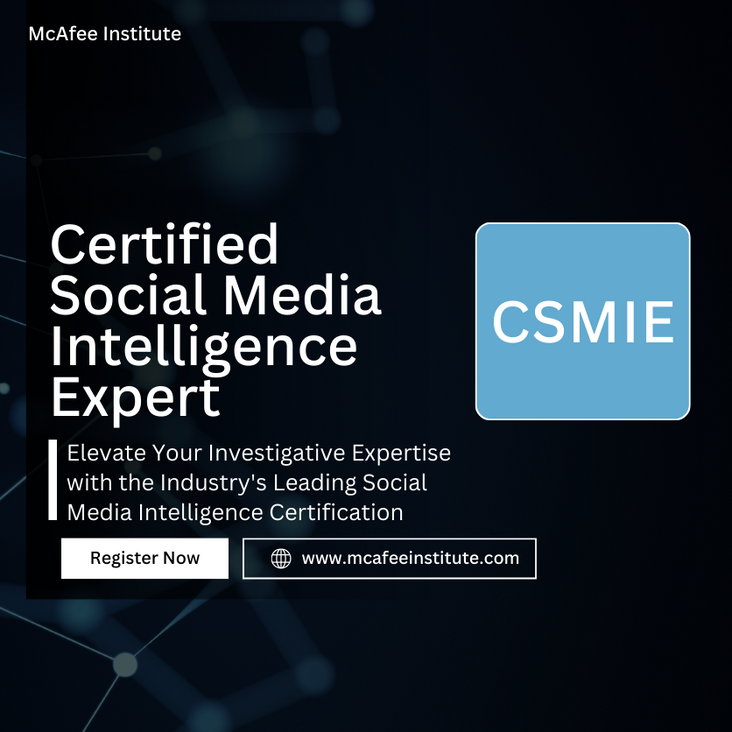

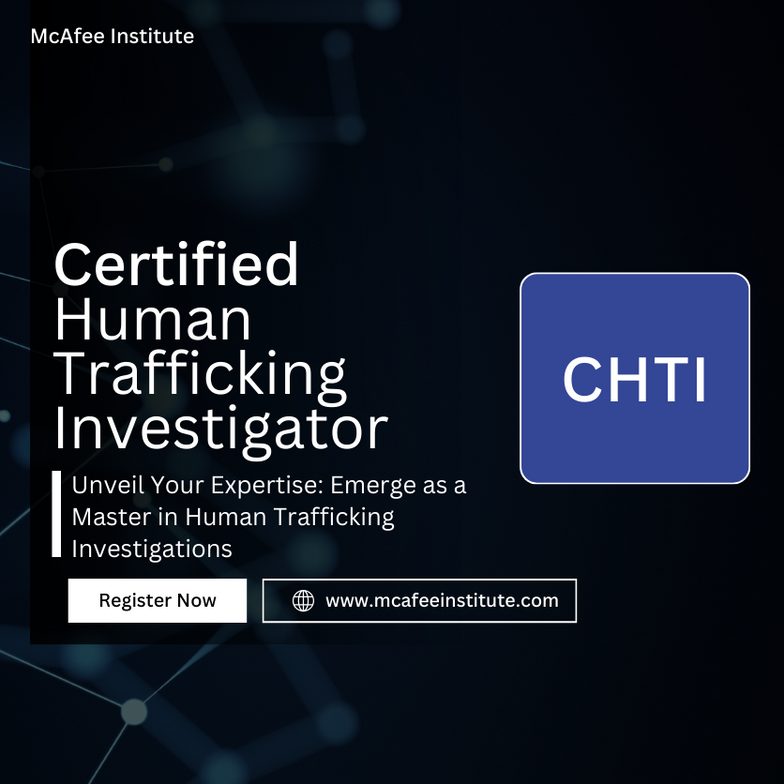



Share:
Uncover Digital Clues: Essential OSINT Tools for Social Media
Unlocking Public Confidence: Strategies for Accountable Investigations